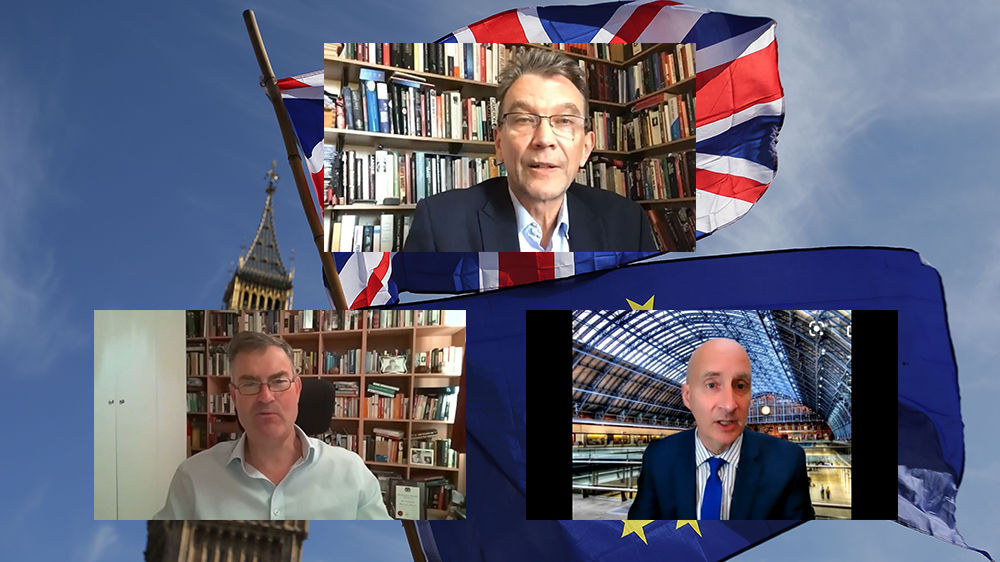Even the most ardent Remainers admit rejoining the EU is a distant prospect
David Gauke and Andrew Adonis argued for a step-by-step approach to a closer UK-EU relationship at The Independent’s event to mark the fifth anniversary of the EU referendum, writes John Rentoul


How will Britain rejoin the EU and when will it happen? Those were the most popular questions from Independent readers at our event last night to mark the fifth anniversary of the referendum vote to leave.
Our guest speakers, David Gauke and Andrew Adonis, former cabinet ministers for different parties, agreed that in the short term the instability of the Brexit deal would push the UK into a closer relationship with the EU, but that rejoining was as yet a distant prospect.
Lord Adonis, speaking with a picture of St Pancras station as his Zoom background, said that he was about to set off to Brussels to negotiate our joining the EU. He said that in the meantime the only way Boris Johnson’s government can stabilise the relationship is “by taking a significant step towards the EU”.
He said he sat opposite David Frost in the House of Lords “and he doesn’t pretend the Brexit deal is stable either”. According to Lord Adonis, Lord Frost admits that the British government wants a deal on food safety rules for Northern Ireland and temporary work visas for musicians and professionals in the EU, “but we haven’t been able to negotiate one”.
Lord Adonis quoted George Eliot, “Among all forms of mistake, prophecy is the most gratuitous,” and said he would not predict what would happen. But he said that deals would have to be done, and “I hope that begins the process of, step by step, getting towards a closer relationship. If stabilisation takes the form of moving towards the EU, as I believe it will, then we may already have started to see the turning of the tide on this hard Brexit.”
Gauke said that he thought many of the disadvantages of Brexit had been concealed by coronavirus restrictions: “In the services sector, the fact that people aren’t travelling has concealed the fact that people aren’t going to be able to travel because of Brexit.”
But he said that he thought any pressure for a closer relationship with the EU would be offset by the “gravitational pull” of populist nationalism. “The more you go down this path, the more the Conservative Party has got to lose by abandoning it. A more constructive relationship with the EU is not throwing a lot of red meat to the red wall. At some point I think they’ll think this is a bit of a cul de sac, but for some time I don’t see it changing.”
He also did not think that the question of rejoining would arise until there was a “new consensus” in favour of it, which would require opinion polls to be in “60-40 territory”. He said: “I think that if there was a moment when we would rejoin, the bar is really high in terms of public support for it. This can’t be wafer thin.”
This is a point that is also relevant, in my opinion, to the demands for a second Scottish independence referendum. If you have already asked the question and the people have decided, the bar for trying to reverse it has to be much higher.
Gauke said the rejoin question had to be looked at from the point of view of the EU: “If the Conservative Party is going to be a solidly Brexity party for the foreseeable future, would you want to let the UK rejoin if you are going to go through this nightmare, potentially, in a few years’ time?
If there was a non-Conservative government and a narrow referendum to rejoin – non-Conservative governments, with one big exception, don’t tend to last very long – the Conservatives could come back in and the whole thing starts again.”
Lord Adonis did not disagree, but pointed out that politics can sometimes change very quickly. “I was described in The Times the other day as a quixotic eccentric. I was delighted. Today’s quixotic eccentrics become the people who determine what happens tomorrow.” He said his aim as chair of the European Movement was to “become a major political force in exactly the way that Ukip and the Brexit Party were”. They put pressure on the main parties from the outside to secure a referendum: “We need to do the reverse. The same mechanism which they used to get us out is the mechanism that we should use to get us back in: a referendum.”
Gauke didn’t think Labour and the Liberal Democrats should advocate rejoining, but said he thought Lord Adonis should, and he supported “Andrew being the Ukip of the European cause”. He said: “We should look at what the Brexiteers did. Even people like Steve Baker – until the referendum got going, they weren’t calling for leaving; they were saying, ‘Of course we would like to stay; we just want to reform it.’ Anyone who knew anything about it knew that what they were demanding wasn’t possible, but very few Conservative MPs were openly calling for leaving the EU even in January 2016. It was only when Cameron came back from the talks that they said, ‘It’s not enough.’”
Gauke accepted that it was “hard to defend” a middle position between “what they call a ‘clean Brexit’” and full EU membership, but said that if he were running an opposition party, “I would say the current situation isn’t working; we need something closer.” He said: “Both Labour and the Liberal Democrats are a bit embarrassed about this, but they do need to lean into it.”
You can watch The Independent’s EU referendum anniversary event featuring David Gauke, Andrew Adonis, John Rentoul, Kate Devlin and Andrew Grice here
Join our commenting forum
Join thought-provoking conversations, follow other Independent readers and see their replies
Comments
Bookmark popover
Removed from bookmarks